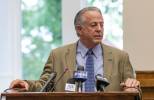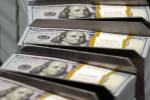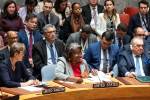Sandoval still no Gibbons
Whatever else may be said about Gov. Brian Sandoval, you can't say he's just like Jim Gibbons.
When Gibbons invited a contingent of Republicans to the Capitol to witness his anticipated veto of a series of tax-and-spending bills, he did it on the front steps, dramatically waving bills stained by the red ink of his custom-made "veto" stamp for reporters and spectators.
Sandoval did his maiden vetoing behind closed doors, without a single reporter or member of the public as witness.
Still, the story had all the drama of a Titanic documentary: You totally know how it's going to end.
The first vetoed bill, Assembly Bill 183, was doomed from the start. Assemblywoman Debbie Smith, D-Sparks, long before the current session began, requested the bill to allow Washoe County schools to use money in a debt-service account to fix up older schools. She had no idea at the time Sandoval would covet that money to "balance" the state budget.
Sandoval, trapped by the twin realities of a recession-plagued economy and his ill-considered "no tax" pledge, realized he couldn't keep his promise without new money somewhere. So instead of raising taxes, he decided to raid school district reserve bond funds, originally to the tune of $425 million, later revised down to about $301 million.
When Smith's bill came through the Legislature, it wasn't even necessary for Sandoval to object. Democrats knew if they passed it -- which they did anyway, on party-line votes in the Assembly and Senate -- Sandoval would veto.
And so he did. In his veto message, Sandoval rapped Smith and others who said the voter-approved bonds (including the bond reserve funds) were meant only for school construction and repair, and to use them otherwise was to break faith with voters.
"They (proponents) have misleadingly cited those who voted for the issuance of the school bonds in the past as supporting their cause today, unfairly attributing to them their narrow view," Sandoval wrote.
But there's a hell of a lot more reason to think voters who approved school construction bonds want them to be used for school construction than there is to think they wanted the money to help get a desperate governor out from between a rocky economy and his no-tax pledge! Even if Smith can't fully claim the mandate of those voters (although some testified for her bill), there's no way Sandoval can claim their support.
In addition, the governor maintained "AB183 will require a new tax at a point when our economy is presenting limited but promising signs of recovery."
Really? Smith notes her bill contains no provision for a tax increase, and that school districts would only have the option to use bond reserve funds if they saw a need and could justify the expense. By contrast, if Sandoval is allowed to take the money for use in his budget, a property tax increase might be necessary if districts find themselves short when it comes time to pay the bond bills.
But that tax increase would not be under Sandoval's signature, and that's all that matters. Speaking before an address to the conservative Keystone Corp. in Las Vegas on Tuesday, Sandoval promised once more not to raise taxes.
"There's an understanding that raising taxes is the worst thing we could do right now," he told the Review-Journal's Laura Myers.
There is? Among whom? Sandoval and -- to borrow a favorite gubernatorial phrase -- the mouse in his pocket?
Sandoval's maiden veto should serve at least to convince Democrats of one thing: This governor will fight aggressively for his no-tax budget, which is another reason you can't say Sandoval is like Gibbons.
Steve Sebelius is a Review-Journal political columnist and author of the blog SlashPolitics.com. His column runs Sunday, Tuesday, Wednesday and Friday. Reach him at 387-5276 or at ssebelius@reviewjournal.com.























